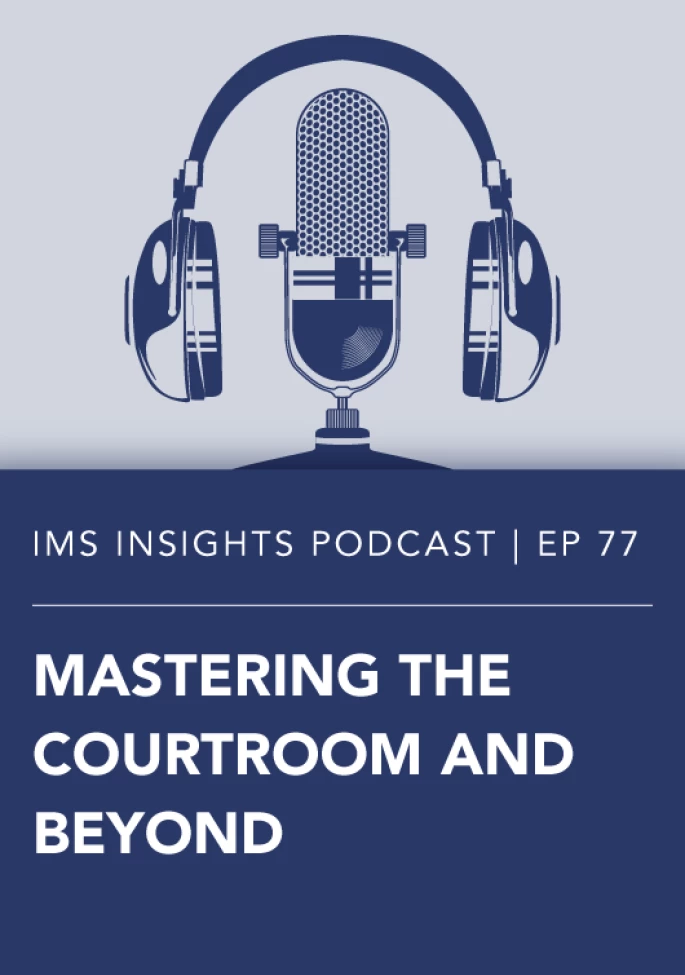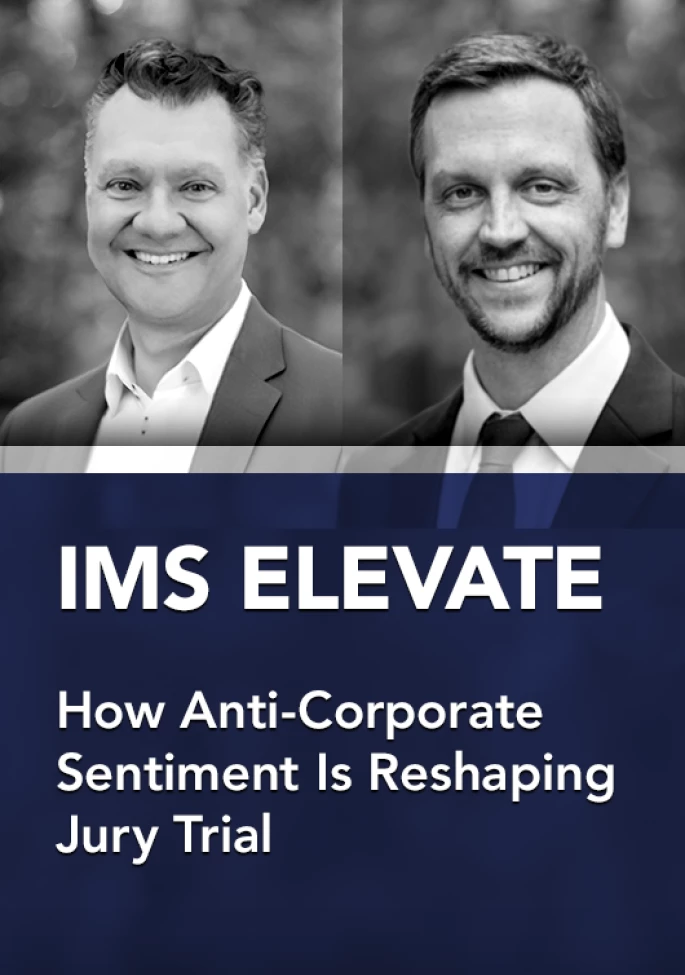Adam Bloomberg (Intro): Welcome to the IMS Insights Podcast, where the nation’s leading experts in litigation trends share their insights.
Today, Dr. Keith Pounds is here to discuss his recent article on how to approach juror anti-corporate frustration through trial strategy. And here’s a little background on Keith. He brings nearly 20 years of litigation consulting experience to his role as a jury consulting advisor. He's a master at identifying and developing compelling case themes and presentation strategies, and he enjoys working with attorneys on complicated cases and finding ways to make the story resonate with the jury. The discussion will be led by our very own Chris Dominic, Senior Strategy and Jury Consulting Advisor. Chris, over to you.
Chris Dominic: Hey, thanks, Adam. Keith, how you doing?
Keith Pounds: I'm great. How are you, Chris?
Chris Dominic: Good, good. It's good to see you. I'm really curious about your most recent article that you authored on anti-corporate attitudes among today's juries. You and I both work side by side on a lot of matters and I wonder how are you seeing this all play out these days? What's this sentiment that if you had to sort of summarize it, how would you describe it?
Keith Pounds: Yeah. It's, you know, the article was really prompted by the unfortunate murder of the United Healthcare CEO last year, Brian Thompson. And I think the thing that really kind of came to the fore was just not just the shocking nature of the assassination, but the public vitriol that followed in the response to that assassination. And I think, you know, it shocked a lot of people that there was so much anger out there. And, you know, this is something that you and I see a lot in the mock trials and jury research that we do over the last few years. So we wanted to write something that really kind of peeled back the layers on some of the things that we're seeing in our jury research and what we've seen change since the pandemic in particular.
Chris Dominic: Yeah, I think that's a really good point. The change since the pandemic is notable to those of us that are doing focus groups and mock trials every day. I'm curious, are there any particular old playbooks that you see that just for whatever reason, you can see them repeating themselves? And you think to yourself, well, that might have worked in 2015, but not today.
Keith Pounds: Yeah. You know, I mean, that's one of the things. So one of the big changes we're seeing nationwide in all kinds of venues, big and small, is a rise in this kind of anti-corporate sentiment among a large portion of the demographics. And so you have to factor that in when you go into your trial presentation. And one of the things that I know if you are a corporation and you're a corporate defendant, that might typically be done would be sort of like a corporate commercial at the beginning of a defense presentation, saying, "Hey, we're a good company, this is what we do. We have good employees, now we'll talk about the case." And that's really kind of fallen flat. That's the nicest way you can put it. I think it sometimes backfires, right?
Chris Dominic: Have you seen it backfire?
Keith Pounds: I think it does backfire because, you know, one of the things that juries are looking for is, you know, how are you not the sort of the worst-case scenario that the plaintiff is putting out there. And if you're talking in broad general terms with platitudes about yourself, you're just playing right into that playbook that the plaintiffs are suggesting, which is you're a large corporation, you're so big, you don't need to care about the specific plaintiff or the specific allegations that you're facing. It's pretty much the opposite, I think, of what counsel should be thinking about with regard to presenting their corporate client, right. You're not talking about the issues in the case, you're talking about your image. And it sounds to me like you're trying to manipulate me. You know, it's that kind of thing, right?
Chris Dominic: Yeah, that's right.
Keith Pounds: People don't want to be talked down to and they don't want to feel like they're just having the wool pulled over their eyes. They're looking for something a lot more realistic than that. And if you start off on that foot, you're already, I think, maybe a foot behind with your jury. So Keith, if we separated this into the way we work with our clients, you and I, sometimes we're working specifically for the outside counsel, sometimes we're working for the corporate counsel. If we started with outside counsel and said, all right, what can we do about it? Where would you start?
Keith Pounds: You know, one of the things I might start with outside counsel is thinking about how they're going to portray their corporate defendant and as opposed to giving a company commercial. I think it's really effective if you lean right into the stereotypes about the industry that your company works within and acknowledging that to the jury and say, you know, look, I know there's some concerns, you know, about, let's say, for example, privacy and this is a technology case. And I get it and you have reasons to be concerned. But let me tell you about how, what, why what this company did or what this app does is so different than the stereotype. Really kind of differentiating and acknowledging, you know, that the stereotype that's out there and saying, "Hey, we're not that." And we're going to show that to you, to the people you're going to meet and, and learning more about this case. First thing. The other thing is to really think with outside counsel is, you know, the overall story of the case and what are the major thematic issues that you want to bring across to the jury and, and how what corporate representatives are going to be selected to really help bring that to life for your jury.
Chris Dominic: I like the priming reframing combo, Keith. That's very cool. OK, so what about corporate counsel? What can they do about it?
Keith Pounds: Yeah, corporate counsel. It's interesting. You know, we both, you and I have company clients and one of the things that, you know, I think we see is that they face not just that individual case that you're working on in that moment, but they've usually got a raft of other cases coming down the line that may be similar or slightly different, but have similar issues. And so one of the things that I think, you know, corporate counsel is good to think about is how can we come up with an overall strategy for defending these kinds of cases? You know, what kinds of challenges do we see routinely? And, you know, how can we address them with trial preparation, with getting consultants involved earlier. Let's have a conversation before depositions are taken about the case, about potential issues and think about, you know, who's going to be deposed and what they need to be prepared for.
Chris Dominic: Yeah, it's funny. When you and I were talking the last time we ran into each other in one of the many cities you run into each other for mock trials and focus groups, right. We were talking about the fact that one of the things that we can really influence corporate counsel on sometimes when we have a lot of experiences with them as we can remind them of what we don't need to do again because we know it doesn't work. Or, you know, a direction that we want to go because we want to try it and we could maybe run it through a focus group or something. And sometimes there's pushback because it's like, isn't this kind of early? But what would you say to that? Because at least in the conversation you and I had, we were both thinking, actually, that's the way you can guide discovery, right?
Keith Pounds: Yeah. I think it's time well spent early on. And it really, you know, think about how the opportunity to sit down with, you know, with you or myself or one of our colleagues who's, you know, maybe worked on hundreds of cases that are similar to the one we're dealing with here. Let's get in a room. Let's talk with outside counsel inside, you know, corporate counsel, all the stakeholders. You know, what do we, what do we think is going to be presented by the plaintiff? What are some of the real challenges here? And what have you seen as consultants that haven't worked? What has fallen flat in the past and you're really kind of thinking about coming up with a strategy for, you know, who needs to be deposed, who needs to be prepared? And also what is the overall story in this case? You know, how do we get our kind of arms around it and can we make some good strategic decisions with how we allocate our resources and our time as we prep?
Chris Dominic: Yeah, I think that's a really good point. And how have you seen this apply from taking the strategy early on and then applying it to witness preparation in advance of depositions?
Keith Pounds: Yeah. And I think that's so important, thinking about witness preparation, particularly in the rise of this really broad anti-corporate sentiment. And you've got a company witness. I think we could pretty predictably or not, you know, at least have some pretty good idea of the kinds of traps that plaintiff counsel might like to throw in front of a potential corporate representative during a deposition. And so being ready for what those kinds of questions are just depending on the segment of industry or the information that that representative will need to be able to speak to can be really helpful in preparing them for their deposition. But also, I think just as importantly is really kind of being proactive with regard to the company and, you know, the things that are being defended. You know, this is a product we really believe in. That's why we sell it, that's why we make it. Or if this is, you know, this is a technology that has really advanced so many things. And so let's talk about that and let's make sure the witness is prepared to represent that in a way that helps carry the company's story.
Chris Dominic: Yeah. And it's interesting you say that because I think sometimes in the most ideal situations, even early, we've got somebody from the visual advocacy team there with us and they can sometimes help guide discovery by saying, you know, the chart I'd love to be able to put together would be this one. We don't have that data yet necessarily, but we can we go look for it or, you know, can we? Let's try, right? I mean, I know you and I both done things like that. Can you think of anything like that that you've used to maybe sharpen the saw before you go cut, if you will?
Keith Pounds: Yeah. It's so important to not just tell, but show. And, you know, those visual advocates are so good and experienced at being able to come up with visual ways to carry a lot of the weight of explanation to a jury. And that can be really helpful both in how they're preparing our witnesses, but also communicating the message to the court, to the trial, to the jury as well. So, yeah. And they bring so much to the conversation because, you know, one of the things, you know, it could be something a really simple concept that could be illustrated with a simple demonstrative or it could be something a lot more complicated like a tutorial. It's so, you know, for so many defendants, there's a lot of information and a lot of explanation they typically need to do to the jury to make sure they're making a good informed decision. And, and a really good demonstratives help do that so well and so effectively. So it's great to get them involved early on as well.
Chris Dominic: Absolutely. Well, Keith, I'm looking forward to the next time we run into each other on the road. And thanks for joining us today. And thanks to everybody who tuned in. It's all yours, Adam.
Adam Bloomberg (Outro): IMS has served trusted law firms and corporations worldwide for more than 30 years and over 65,000 cases. As a strategic partner for the full case life cycle, our integrated teams provide specialized advisory support, expert witness services, litigation consulting, visual advocacy, and presentation technology to elevate strategies and protect hard-earned reputations. Learn more at imslegal.com.








